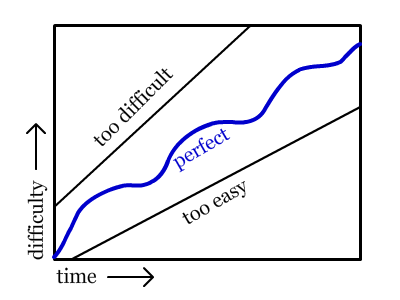We all think a game starts out easy and becomes more difficult along the way. For example, each level is slightly more difficult. COMPLETELY WRONG. Well, not really but many games do it a little different.
The Zelda series is a very good example. The dungeons become more difficult each time, and at the end of the dungeon there's of course the –though not always very difficult– but at least intense boss battle. After you finish that you get to spend some time again in the overworld, where you can relax a bit and prepare for the next dungeon. Zelda's difficulty curve's a bit like this: You see? Overall the difficulty increases but it has it's ups and downs, to allow the player to feel free again after a difficult or frustrating part. Many games do this by including bosses (and that, according to me, is why bosses are still in todays games).This is something I think GM users can easily implement in there games, if you didn't already (maybe without even thinking about it). For example, if you give the player a new weapon, or other feature, give her/him some time to play with it.Well, I hope you can do something with this. It's pretty obvious but sometimes people forget about these things.—–Something different now, in regards to my previous entry: I want to thank everyone who played PaperBlast. Some good advice that I will definitely implement. Esspecially Cesque had some good ideas.Currently though, the project is on hold.I hope to soon release a demo of one of the 2 other games (which are even more interesting).——One last bit: Frozzd.The game that won the YYG Winter Competition is featured as "Freeware Game of the Month" in PC Zone (UK).They had this to say:
You see? Overall the difficulty increases but it has it's ups and downs, to allow the player to feel free again after a difficult or frustrating part. Many games do this by including bosses (and that, according to me, is why bosses are still in todays games).This is something I think GM users can easily implement in there games, if you didn't already (maybe without even thinking about it). For example, if you give the player a new weapon, or other feature, give her/him some time to play with it.Well, I hope you can do something with this. It's pretty obvious but sometimes people forget about these things.—–Something different now, in regards to my previous entry: I want to thank everyone who played PaperBlast. Some good advice that I will definitely implement. Esspecially Cesque had some good ideas.Currently though, the project is on hold.I hope to soon release a demo of one of the 2 other games (which are even more interesting).——One last bit: Frozzd.The game that won the YYG Winter Competition is featured as "Freeware Game of the Month" in PC Zone (UK).They had this to say:
Quote:
"If only every game had this level of professional polish, then there would be much fewer wars and absolutely no terrorists."

Nice, stuff! Good bit about the difficulty, never looked at it like that. Great!
-Elmerniteif(difficulty_curve=up+down){
game.difficulty=good; me.mood=happy;}else{ game.difficulty=bad;}Good point with the Zelda games there.Nice!
I never really looked at difficulty like that. It's a si(gn/ne)! What does it mean?
Congrats on that Frozzd bit!
Curve looks something like sin(x)+x.
Wee, thanks for the mention ^_^
I believe Zelda series are harder to pinpoint in terms of difficulty curve than you make it seem, though, mainly because their world is very open (in some cases you can even decide on the order of the dungeons). That's why you can make up for some difficulties with exploration, or return to a place later when more powerful - and, in general, you seem to get strong faster than the dungeons get hard, which is something of a rule in all open world games.Tell that to the guy who is making IWBTG! !
Glad you guys liked the piece.
@Cesque: You're right, the Zelda one probably varies a lot more, and it also really depends on the player. But that's the great thing about open world games: If you think a part is too difficult you can go somewhere else first (RPG's also come to mind).I don't know how many games use this way of ramping up difficulty, but every game that has bosses does it to some degree.@Rob: That game is hard indeed. I didn't get past the first obstacle… and then watched a youtube vid that showed it all (shame on me).Actually, I thought this was a little too obvious but it definatly shows you have a high potential for future articles. It's good though for people who need to be reminded. I think that people can commonly forget fundemental designing concepts. Anyway, I don't like your Suicide game. It seems you threw it together too fast.